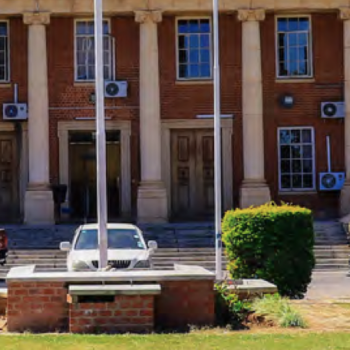
Yesterday, the Botswana High Court heard arguments in Mmusi and Others v Ramantele and Another, a case challenging the Ngwaketse customary law rule which provides for male-only inheritance of the family home.
The case, before Judge Oagile Dingake, began after Judge Dingake heard over a dozen cases which were on the motion roll. Basically, this means he dealt with housekeeping related to these cases: setting dates for hearing of certain matters; issuing orders to various parties to file their papers; and overseeing the nitty gritty of divorces. Once that was over, we got started.
First up was the attorney for Mmusi and her sisters, Tshiamo Rantao. Rantao began with conceding that the primary issue in the case as Ramantele’s attorney pointed out in his heads of argument, was not the rule of male primogeniture which doesn’t apply in this case, but the rule under Ngwaketse customary law which gives the family home to the youngest son.
After that concession, Rantao faithfully followed the arguments made in his heads of argument, pointing out the constitutional provision at issue (section 3(a) providing for the right to equality), the relevant international and regional law and why the infringement under section 3(a) was unjustified. In particular, he pointed to the South African Constitutional Court’s decision in Bhe and Others v Khayelitsha Magistrate and Others, which held that the rule of male primogeniture, resulting in inheritance by the eldest male, violated the right to equality as society had changed such that the rule which used to result in the eldest taking care of his extended family, including the women, no longer was justified. In addition, he noted that even the Botswana government in its submission to international human rights bodies highlighted its concern regarding gender discrimination in inheritance.
Ramantele’s attorney, Thabiso Tafila, was up next and he put on a good show. Tafila also took the court through his heads of argument. He was unequivocal that the Ngwaketse customary law did not discriminate against women, but merely differentiated. He went further noting that under the customary law, both women and men inherit from their father’s estate. He noted that men inherited the cattle and fields; while women inherited the household goods, such as pots, pans and utensils. Judge Dingake noted his skepticism at that, but Tafila was not dissuaded ending with arguing that this is the custom for this particular tribe and thus they should get to do what they choose, stating that one can find fairness in unfairness.
Justice Dingake seemed to accept that the customary rule at issue was discriminatory. But he was particularly interested in the relationship between section 3 of the Constitution, which provides for the right to equality, and section 15 which provides for freedom from discrimination. Rantao particularly made his case under section 3, which provides only for an infringement if the right would infringe on the rights of others or if such infringement is in the public interest. He did not make an argument under section 15, which has a specific exception for all matter involving the “devolution of property on death” under section 15(4)(c). Judge Dingake’s concern was whether the limitation under section 15(4)(c) requires him to input that limitation when following the inquiry under section 3.
However, this relationship has been fully addressed and finalized by the Botswana courts. In the seminal case of Dow v Attorney General, the Court of Appeal held that “the word ‘discrimination’ is not mentioned in section 3, therefore, does not mean that discrimination, in the sense of unequal treatment, is not proscribed under the section.” This was then applied by the High Court in two cases, Kamanakao and Others v Attorney General and Another, where the High Court held that section 2 of the Chieftainship Act did not violate section 15 given the exception outlined in section 15(9), but it did violate section 3(a) and Stratosphere Investments (Pty) Ltd t/a Club Havanna and Others v Attorney General, where the Court found that the applicants failed in their claim under section 15, but noted that the applicants could have alleged a separate violation of section 3.
Judge Dingake did not appear convinced though. By the end of the hearing, he was keen to hear from the Attorney General on this issue in order to help guide his decision. And indeed, later in the day, he issued an order asking the Attorney General to present and let the Court know whether it was for or against this change in the customary law. The Attorney General is expected to appear on 28 June 2012 with all of the parties.
ONE RESPONSE TO “BOTSWANA HIGH COURT HEARS CUSTOMARY INHERITANCE LAW CASE: UPDATE FROM THE COURTROOM”
Elia Ngwako Kgatle says: 15 APRIL, 2014 AT 11:30 AM I therefore like to comment on the issue of male premogeniture with reference to the south african Bhe case,the issue of male premogeniture was in nature a an unfair practise towards the females as far as the issue of inheretaNCE in customary law is concerned. It is therefore in contrary with the constitution and any law which is in consistent with the constitution is invalid for the purpose of supremacy



